Mike White’s HBO show The White Lotus is like the Bible- everyone makes it mean whatever they want it to mean. A person’s interpretation tells you a lot more about their own worldview than about the thing itself.
Take this little exchange between the mother and daughter from season one when the dad finds out that his late father was gay. The Gen X mom pities the dad. The Gen Z daughter worries he might be homophobic.
 Tiktok failed to load.
Tiktok failed to load.Enable 3rd party cookies or use another browser
The comment section is almost exactly divided in half- one half thinks Mike White is clearly trying to show that woke Gen Z is THE WORST! The other half convinced Mike White is clearly trying to make the point that anti-woke Gen X is THE WORST!
I imagine Mike White is off giggling somewhere reading about all the points he is clearly trying to make.
The real genius of White Lotus is that it’s a mirror. Tell me who you think the most diabolical villains are, tell me who you think the most innocent victims are and you’ve just given me a pretty good picture of your views on class, race and gender.
I’ve developed a fun little hobby of typing “White Lotus analysis” into the TikTok search bar, not to hear people’s analysis of the show, but to analyze whoever is analyzing.
It’s fascinating.
Exhibit A: “the toxic trio” (Harper Bazaar’s words, not mine)

Up until about episode five the vast majority of the commentary I saw online about season three was centered around the three female friends- Jaclyn, Laurie and Kate.
Glamour wrote How The White Lotus Nails the Ugly Truth About Female Friendship, The New York Times wrote The Joy and Pain of Three-Way Friendships, Vogue wrote If the White Lotus Teaches Us Anything… Never Take a Three-Person Girls’ Trip.
Endless discussion about the trash talking, the gossiping, the backstabbing, the perfectionism, the competition, the people-pleasing, the lying.
Whenever people online rank the characters, at least one of the trio, but usually two, are ranked among the most diabolical.
This TikTok for instance puts Megan Monaghan’s character Jaclyn at #12 saying she “is SO INSUFFERABLE. She is egotistical and cruel. Lacks a lot of emotional intelligence. Her entire character is focused solely on wanting to be young and younger men."
Which… fair enough.
Except this same TikTok ranks Jason Isaac’s character Timothy Ratliff at #4 saying, “I feel awful for him. He's genuinely such a good dad and has good intentions. So what if he committed fraud... #freehim." And Walter Goggins’s character Rick comes in at #3.
This is interesting because the stakes of the diabolical women’s actions are… hurt feelings. But the stakes of Timothy and Rick’s actions? Homicide, fraud, embezzlement, prison. Both have guns and are fantasizing murder.1
Putting gossip on par with murder in terms of diabolical-ness is…. well…. interesting2.
Men running from prison trying to kill people? Aw. Our internet boyfriend. #freehim.
Women gossiping? STRAIGHT TO JAIL!!!3
Whoopsie, my worldview might have slipped out in my analysis of the analyzers there.
Exhibit B. The “non-toxic” duo
Since my feminist worldview is out of the bag, the commentary around this relationship online makes me feel like I’m taking crazy pills. Or rather that everyone else is taking crazy pills and I’m the sole sober one watching this show.
Chelsea is hopelessly devoted to Rick, frequently referring to him as her “soulmate.” Meanwhile, Rick calls her an “annoying” “gold digger” “idiot” and treats her like a particularly bothersome piece of gum stuck under his shoe. He leaves her alone most of their vacation to go kill someone with ZERO updates and repeatedly puts her in danger.
But the way people talk about this couple online, you would think they are the result of cupid’s most successful arrow— the poster couple for true love.
Time Magazine published an article entitled "Are Chelsea and Rick the Healthiest Couple We’ve Ever Seen on The White Lotus?"
Under a recent clip of them on HBO’s TikTok account, there wasn’t ONE comment that didn’t celebrate their love. Here’s a small sample: "My favorite couple" "I love them so much" "They belong together." "This was so genuine. He loves her." "They are soul mates" "I want him to be my boyfriend."
Girl what.
Speaking of analyzing the analyzers, the actors themselves seem to have wildly different takes on the health of the relationship and the people they are portraying.
In an interview with Vogue, Amy Lou Wood who plays Chelsea said that she tries very hard not to judge the character she is portraying as an actress because that is the death of a performance, but she found it very difficult not to judge Chelsea and often judgment would pop up against her will:
“There would be moments where I would be like ‘Chelsea! Come on!’”
“She is with someone she knows is unable to see her.”
“She acts like she doesn’t have a choice but to stay with him.” - Amy Lou Wood
Meanwhile, Walter Goggins says this of his character Rick in a recent interview:
“He starts off very taciturn, very quiet. He’s very hard to understand— the chaos and sadness he’s carrying—but hopefully once you find out the motivations of why he’s there, hopefully your dislike of him will turn into understanding and then empathy and then hopefully rooting for him and then falling deeply in love with him.”
Girl what.
On his own Instagram account he says that it took seven episodes for his character to smile and that “Rick earned every inch of it. Serenity. Peace.”
Girl. What!? He earned every inch of that serenity smile drunk as a skunk at a club surrounded by naked women, while ignoring his girlfriend’s calls and texts for days, moments after encouraging his friend to end his own sobriety?!?! And we are supposed to applaud him and fall deeply in love with him because he held a gun to the head of his father’s killer but didn’t pull the trigger?!?!
aM i oN cRaZy PilLs?!?!? What part of this man am I supposed to be falling in love with exactly? The only redeeming thing about him is that he managed to not commit homicide. #yayforyou #Iguess?
Oops there goes my worldview again.
Ahem. As I was saying, everyone’s interpretations are comically different, yet everyone is so convinced that their interpretation is the obvious interpretation.
Anyway.
Here’s my interpretation4 of season 3 of The White Lotus as a middle-aged woman who writes articles about patriarchy for a living.
In other words, the correct interpretation. Obviously.
Mike White, here’s the point you are clearly trying to make.
As I was scrolling TikTok over-analyzing the White Lotus analyzers this week, a non-White-Lotus TikTok came across my feed that perfectly tied together what I’ve been trying to say with my past five articles on patriarchal masculinity and what I see as the main point of White Lotus season 3.
What a gift!
The creator is called Mell.5 Here’s what she has to say:
“In her book All About Love bell hooks talks about how most men will not know true love in their lifetimes because under patriarchy when given the option men choose power over love…
Being in love with another person is a mutual sharing of power. It's a symbiotic relationship. You're feeding each other. It’s not you standing over another person. You cannot love someone and have power over them at the same time.” - Mell
Because love and equality are scary and vulnerable (I could “become whipped,” be emasculated, lose control, etc), many men choose power over instead of power with.
In making that choice, they lose out on the experience of love.
Mell then applies this same concept to other systems of power- namely race and class.
She says the white people she knows who are willing to go off the white script are the happiest. Conversely, the white people who try the hardest to prove and perform their status—through the clothes they wear, the house they live in, the words they speak, the people they choose to marry, the schools they send their kids to, etc—are the most miserable.
“The only way you can find happiness and love as a white person or as a man or as a rich person is to buck those systems of power….” - Mell
This is exactly the point I was trying to make in my patriarchal masculinity series. The most miserable men are those who are most desperate to prove their masculinity.
The patriarchy offers men power, but it comes at the expense of everything else. Especially at the expense of the most important ingredient to life satisfaction: strong connection to their fellow humans.
The same concept applies to any hierarchy.
Mike White has has said precious little himself about White Lotus Season 3, so we don’t have as good an idea of what he was going for as we did when he was doing interviews for the first two seasons.
The best I’ve found is when he said the main themes of season 3 are “karma, identity and the cycle of suffering.”
The main questions I see in White Lotus season 3 are: What do you do when you lose status? What are you willing to sacrifice to maintain power over others? What lengths would you go to to avoid equality? What do you experience as a result?
Let’s break it down by character.
The Ratliff family
Timothy Ratliff
What do you do when you lose status?
Mike White likes to take characters sitting atop society’s ladder and shove them off to see how they take it.
And Timothy?
He doesn’t take it well.
Timothy arrives in Thailand to the news that the FBI has caught him red-handed in a money-laundering scheme.
His wealth, career and reputation are all about to flush down the toilet.
Of Timothy’s predicament, actor Jason Isaacs says,
“He cannot imagine for a split second how they’ll survive and who they could be without their reputation, all this generational wealth and privilege and state and local status.”
While his distress is of course understandable, no one would react well to facing jail time, still, Timothy would rather die and kill his family than face losing his privileged status.
What lengths would you go to to avoid equality? Timothy seems to be willing to go to great lengths- namely murder and suicide.
Victoria Ratliff
When it comes to entertaining television? I give her five stars. Victoria Ratliff makes for excellent TV and actress Parker Posey freaking nails her Southern rich white lady performance. But when it comes to a healthy model for living? 0 stars.
Victoria would also rather die than face “an uncomfortable life.”
Interestingly, for someone with so much money, free time, privilege and status, she is constantly miserable. She relies on drugging herself to get through routine social interactions, to get to sleep and even before getting a massage.
She judges everyone around her according to her white, wealthy, Christian standards and no one is measuring up. She oozes judgment for anyone under their class status as “trashy” and “lacking morals,” but she equally judges her fellow rich, white people at the resort and on the yacht.
Consequently, she doesn’t seem to have close connections with anyone but her family, and even they never escape her judgment.
She chooses status over connection every time.
A few quotes:
“What if we lost everything?” “Honestly I don’t know if I’d want to live.”
“I don’t want her thinking she’ll be just fine if she’s poor. She needs to fear poverty. Like everyone else we know. That way she’ll make good decisions.”
“Actresses are basically prostitutes.”
“You are all gorgeous and you come from money, so you have to be hyper-vigilant.”
“I’m praying that Jesus will save her from the Buddhists.”
She is the embodiment of Mell’s observation—that the more obsessed you become with maintaining status and wealth, the more miserable you become.
Equality is her worst nightmare.
For TV? Hilarious. No notes. For real life? I have a few notes.
Saxon Ratliff
Saxon spends the first half of the season aggressively stating his superiority over his fellow humans.
When it comes to how he reacts when faced with being knocked down in class and status, he is right in line with his parents. He tells his father, “If I’m not a success, then I’m nothing and I can’t handle being nothing.”
His entire identity is wrapped up with sitting atop society’s hierarchy. He tells his brother that “people want to be used” and he intends on using them however he wants—in business, in sex.
But then, when the tables are turned, and he is used sexually without his consent, he does not like it. At all.
When Mike White pushes Timothy off the wealth hierarchy ladder, Tim desperately clings on, scraping his fingernails along the rungs. He’ll try anything to escape, avoid and delay the fall. But when Mike White pushes Saxon off the sexual hierarchy ladder, who knows, it may actually humble him.
We shall see.
Frank
Frank is the ying to the Ratliff’s yang. He is not pushed off the hierarchy, he chooses to climb down. He moves towards his suffering rather than trying to out-run it or buy his way out of it.
But not at first. He starts out in Thailand on a hedonistic treadmill of money, drugs and sex. Lots of sex.
“When I got here, you know, I was like a kid in a candy store: got money, no attachments, nothing to do, and I started partying. It got wild. I was picking up girls every night… sometimes multiple ladies a night. I – I was out of control. I became insatiable.” - Frank
Until eventually he realized, “I could fuck a million women and I’d still never be satisfied.”
So he chooses to stop.
“I realized, I gotta stop, the drugs, the girls… I got into Buddhism, which is all about… getting off the never-ending carousel of lust and suffering.”
And what makes Frank climb down the ladder?
Empathy.
A hella weird, rather eff-ed up version of empathy. But empathy none the less.
He puts himself in the shoes of one of the Asian girls he was f-ing by imagining he is her.
He tells his friend Rick that he was miserable while lost in the women, drugs and money. Now that he is sober and abstinent by choice, he is at peace.6
Chloe
Occasionally in my comment sections talking about patriarchy the question comes up, “Why do SO many women put up with husbands who treat them so horribly?”
Chloe provides an answer. Not always the answer, but often part of it—class status, stability, freedom, money and social status.
For her part, Chloe does not seem to care for her boyfriend Gary much. She’s always complaining about how grumpy, controlling and no fun he is. She’s often mad at him. She even tells Chelsea that she thinks he is capable of murder.
And yet she stays.
Her boyfriend’s offerings from atop the wealth/status pyramid are worth the sacrifice of being with someone she doesn’t like much and dealing with his grumpiness and control.
She also seems to have similar thoughts to Saxon when it comes to using people to get what she wants.
She is willing to go to great lengths to maintain her status.
Belinda
Belinda is the healthiest character on The White Lotus. There is no close second.
She has a healthy relationship with her son, a consensual fun fling with her co-worker and seems the most well-adjusted, satisfied human ever to appear on this show.
As a black woman working for the bougie hotel, she does not sit atop any of the class, race, or gender hierarchies.
And when she is offered hush money by Greg, she refuses it.
Jaclyn
Jaclyn loves her spot at the top of any and all ladders. She’s got looks, men, money and a successful career as an actress.
And how does she react when knocked down a few pegs?
By reasserting her spot, kicking down whoever may be blocking her ascension.
When she feels rejected by her hot young husband not returning her texts, despite encouraging her friend Laurie to hook up with Valentin, she swoops in and hooks up with him first. Thus reasserting herself as the most desirable of the group as she has always done.
Mook and Gaitok
Like Belinda, Mook and Gaitok aren’t sitting atop any of society’s pyramids.
Instead of pushing them off the ladder, Mike White offers them a step up.
But whereas Gaitok is satisfied with his current position on the ladder, Mook wants to climb higher. And she wants Gaitok to as well.
In every interaction, she encourages Gaitok to be more ambitious. She wants him to go after a more prestigious body guard job and is clearly disappointed with his satisfaction where he is at and his commitment to non-violence.
“Even if it’s not having power over people, it's trying to align with power structures where you will receive social status, which is a roundabout way of trying to hold onto power at the expense of your soul.” - Mell
None of this is to say that money always brings misery and poverty is paradise, but the more driven you are to place yourself above your fellow humans, the more obsessed you become with proving your status, the more suffering you bring upon yourself and others.
We watch these characters try to out-run their suffering in different ways, but it never works:
They can’t buy their way out of suffering as Greg’s character tries and fails to do.
They can’t drug, drink or numb themselves out of suffering as Timothy, Victoria, Chloe, Laurie and Frank in turns try to do.
They can’t protect themselves from suffering by clinging to their high-ranking identities.
They can’t wellness-center their way out of suffering. In fact, the wellness counselor repeatedly tries to bring Rick’s suffering to the surface so he can deal with it.
It’s almost like Mike White is trying to say that suffering is a part of life. And trying to run from it only makes it worse.
Say! That’s the first noble truth of Buddhism!
The Buddhism of it all
All the seasons of White Lotus focus on class, but the other main theme for Season 1 was race, for Season 2 it was sex and we were told for Season 3 it would be spirituality.
As someone who has spent the better part of the past decade neck-deep in religious deconstruction, I was very excited to watch Mike White point out the hypocrisy of religion as he does so well with other societal institutions.
And there is a smidge of that—Victoria asking Jesus to save her daughter from the Buddhists for instance—but overall, instead of pointing to its hypocrisy, Mike White seems to be holding up spirituality, and Buddhism in particular, as an effective tonic to these characters’ various ailments.
This makes sense since Buddhism is all about equality.
The Buddha himself was born a prince. Then upon going out and seeing all the suffering of the world, forsake his privileged life and lived out his days as a pauper speaking out against the caste system.7
Buddhism seems to be the link between Mike White’s stated themes of season 3: karma, identity and the cycle of suffering.
The main tenet of Buddhism is that we crave and cling to impermanent identities, jobs, statuses and things, which leads to a state of dukkha where we are “incapable of being satisfied.” This locks us in a repeated state of suffering.
The four noble truths are:
Suffering is a universal experience.
Attachment/craving/desire/thirst/greed causes suffering.
Suffering ends by letting go of attachment/craving/desire/thirst/greed.
The path to the cessation of suffering is detachment.
So basically, theme of season 3 is spirituality after all- it puts each character somewhere in this Buddhist cycle of suffering. The characters that are clinging and craving the most to status and greed are suffering the most (Timothy, Parker Posey, Gary, Saxon, Jaclyn). The characters that are losening or have loosened their attachment to status at the top of a hierarchy are those suffering the least (Belinda, Piper, Frank, Chelsea).
The thesis statement of the season comes package-wrapped by the Buddhist monk, who says,
“Many young people come here from your country. I think because maybe spiritual malaise. Lost connection with nature, with family, with the spirit. What is left? The self. Identity. Chasing money, pleasure.
Everyone runs from pain towards pleasure, but they get there only to find more pain.
You cannot outrun pain.”
Then when Tim asks him what happens when we die, the monk says that while alive, we forget we are all a part of the same thing. We think we are separate, higher, better. “A single drop of water flying upward.”
But then, “you descend back down, you die. You land back into the water and become one with the ocean again. No more separated. No more suffering. One consciousness.”
We rise to different statuses in this life, but ultimately, we all return to total equality, which the monk says “will be a happy return. Like coming home.”
Equality is our natural, most happy state.
The further we separate ourselves from each other, especially the further we insist on being above each other, the more miserable we will be.
But that’s just my interpretation.
What’s yours?
Do you enjoy thinking about and discussing all things patriarchy and feminism?? Cool me too. Come discuss with me and the Matriarchal Blessing community by becoming a paying subscriber. Our next gathering will be April 27 when we will be discussing Hood Feminism by Mikki Kendall.
Alternatively, you could also just pay me for my work just cause, that is also very cool and very appreciated! Thank you!
I am writing this the day before the finale, so I don’t know how it ends yet!
And by interesting I mean patriarchal.
Not to mention! Last season, we saw the female friends’ exact same story line play out but with male friends.
In season 3, Jaclyn is the hot shot who has been trying to outshine her friends since high school, both in terms of success and getting men.
In season 2, Theo James’ character Cameron is the hot shot who has been trying to outshine his friend Ethan since high school, both in terms of success and getting women.
Only Cameron’s actions were way more diabolical than Jaclyn’s. He gets naked in front of his friends’ wife on the first day. Then tries to sleep with her multiple times.
And yet where were the thousands of think pieces and outraged TikToks about Cameron? Huh Glamour? NYT? Variety?? Where were you?
Yawning? Shrugging? Claiming boys will be boys?
Oh you thought I already offered my interpretation? No, no- that was just a preliminary warm up interpreting others’ interpretations. Now we’re onto the main event.
She’s amazing. Give her a follow. I looooooove her recent TikTok on why we have reason to hope.
Shhhhh, we’re pretending the end of episode 7 didn’t happen. He gave up the drugs, alcohol and meaningless sex I said!
Mike White himself has said that meditation and Buddhist practices are the only things he has found that really help him when he is depressed.




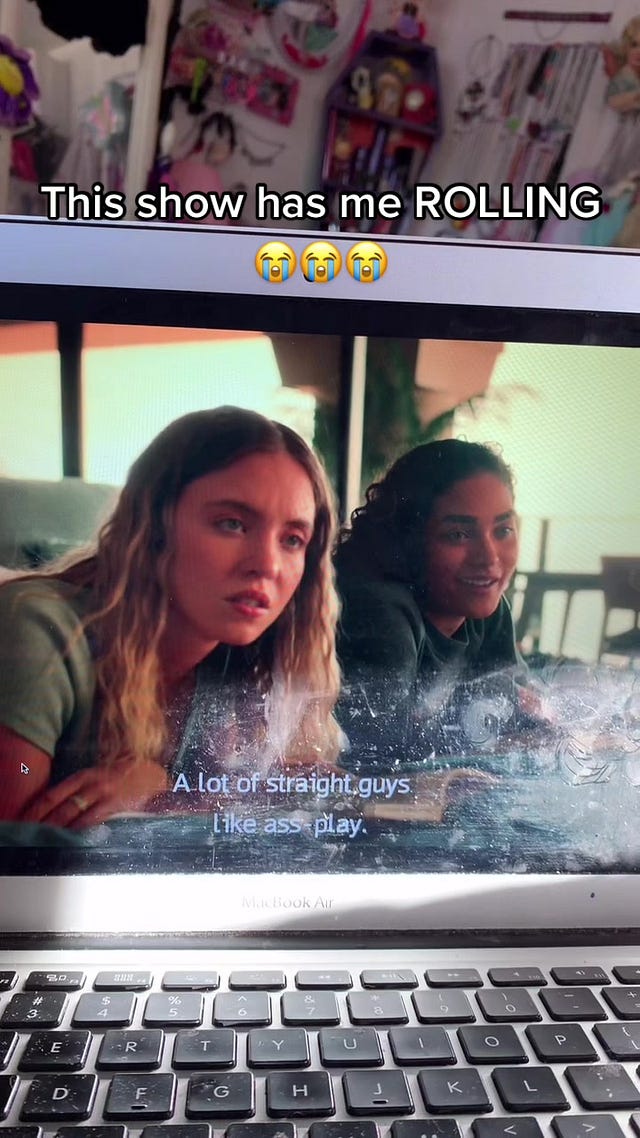
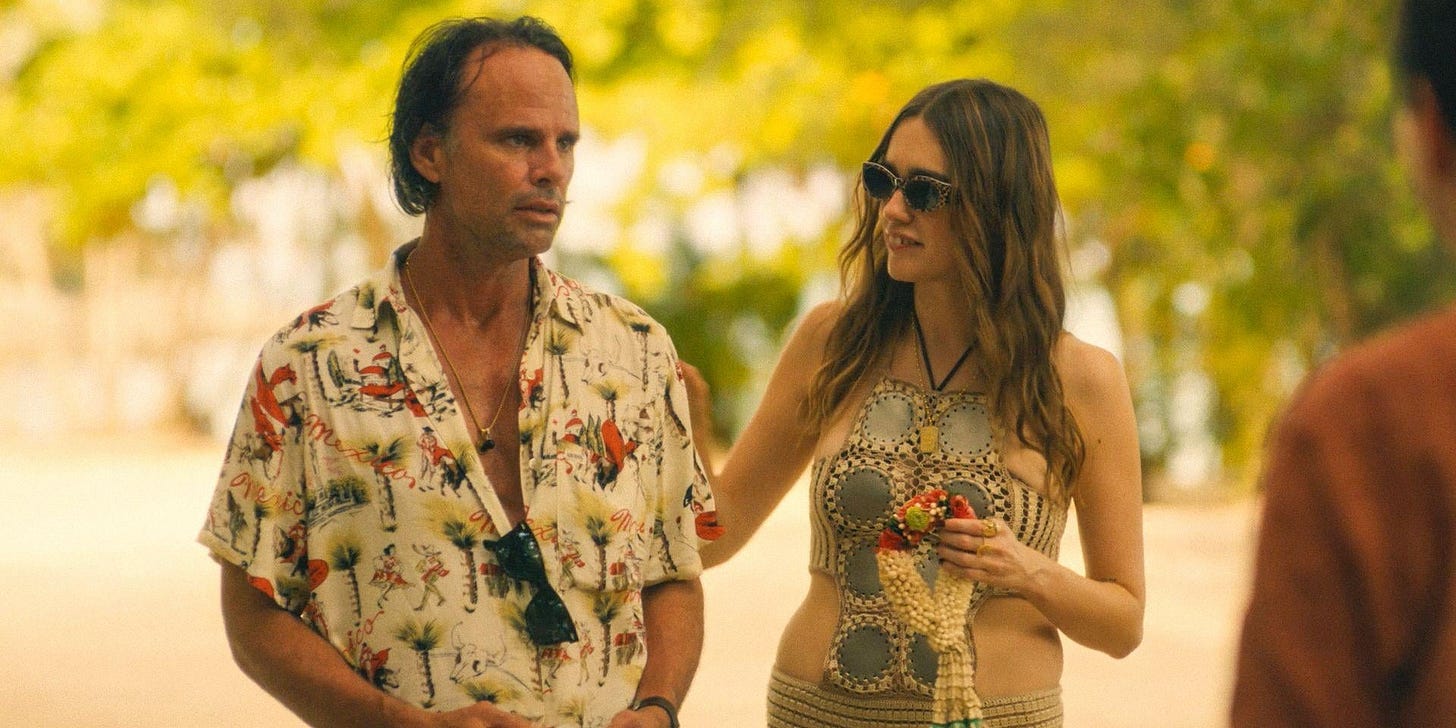
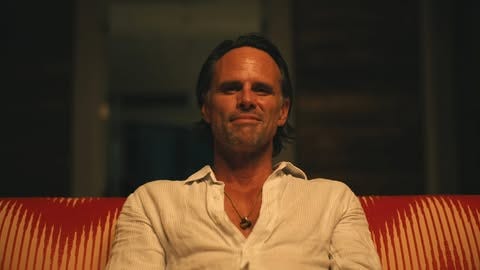






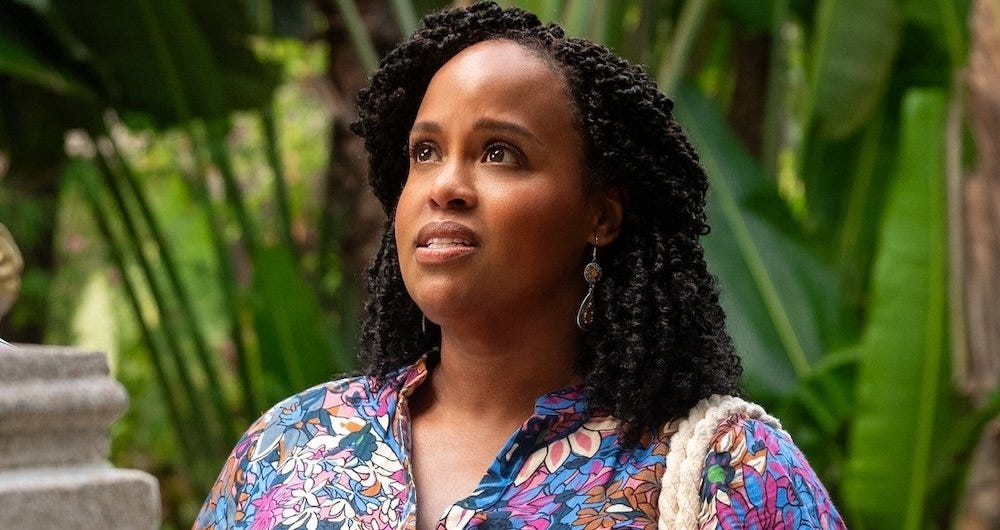


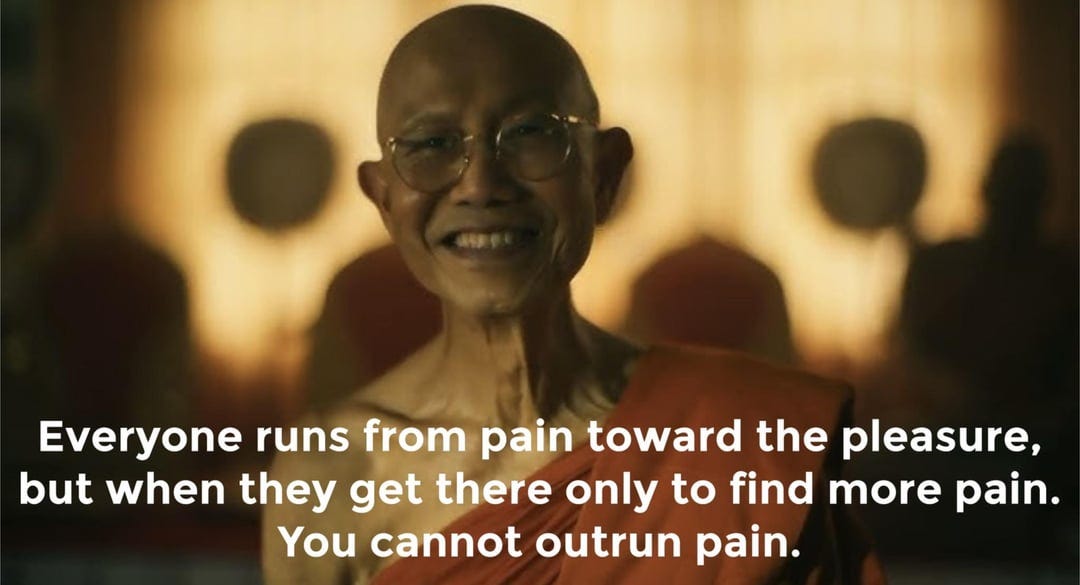
I've noticed that in this season White is kind of obsessed with shots in which people are under water or semi-underwater; the camera often moves between being above the water and under it. Including in the opening montage of the first episode when we are in the lily ponds of the resort hearing gun fire but have no knowledge of who is shooting at what. The uncertainty of that opening scene (who lives, who dies, who shoots) has been suspended across the whole season--to be revealed in the final episode presumably.
All of which chimes really well with your reading: what does it mean to be "under water"? If your head and your vocabulary reside in the world of money (Ratliffs) it's not a good thing. But if you are a Buddhist, maybe just a return to life, to being one with the ocean.
Love your analysis--thanks for sharing this!
I guess it is your world view that makes people interpret these characters and relationships so differently, but I also wonder about people’s critical thinking skills. Maybe that’s harsh. Specifically that Time Magazine piece, yikes! A healthy couple? Have we set the bar that low for men? Is it just because people like the actor already and that bleeds into your reaction to him? Maybe it’s just wanting to have someone to root for on the show?! Chelsea represents to me women I’ve known who go so far to excuse the behavior of men and want to save them from themselves. She seems simply impressed that he is expressing any type of emotional depth at all and decides that is only a good thing, despite how narcissistic and mean that expression is. She seems to be practicing a radical empathy that is a detriment to herself. Maybe he will redeem himself in the last episode but she really deserves a lot more than she’s getting. Maybe we just have a similar perspective but I agree with you and Mell on your interpretation of all these characters.